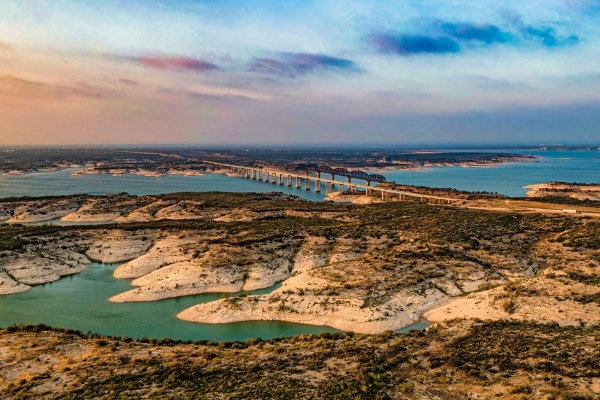Sen. Ted Cruz on Harvey Recovery, Trade and a Divided Congress
Published Apr 23, 2019 by A.J. Mistretta
Senator Ted Cruz discussed topics ranging from Hurricane Harvey recovery to immigration at the Greater Houston Partnership’s 2019 State of the Senate event April 23.
The Texas Republican who won reelection in the fall following the most expensive Senate race in U.S. history said he’s re-calibrated his approach to his job within a now divided Congress. But the Houston resident said he remains committed to making this region more resilient and improving the economy and job growth across Texas.
Cruz participated in a fireside chat with former Partnership Board Chair Marc Watts. Here are a few takeaways from the discussion.
On the Aftermath of Hurricane Harvey
Cruz reminded the audience that Hurricane Harvey was the second most-costly natural disaster in the nation’s history. “We experienced devastation that pounded the State of Texas unlike anything we’ve ever seen before.” But the storm also showed what people across this region are made of. “I’ve never been more proud to be a Texan and a Houstonian as I was after Harvey,” Cruz said. “Nobody cared what your ethnicity was, your politics or your religion, it was simply Texans helping Texans.”
Cruz said while $30 billion in federal funding has come into the state for Harvey recovery and infrastructure improvement efforts, billions more is yet to come. He said his office is working to get $4 billion released by the Department of Housing and Urban Development that has already been appropriated by Congress.
On the Economy
“From the first day, my number one priority in the Senate has been jobs, and the reason is that that is the top priority of our state,” Cruz said. “Texans want more jobs, higher wages and more opportunity.” But, he said it’s not government’s responsibility to create jobs but rather to foster an environment that allows the private sector to create jobs. “In my office it’s a mantra: simplify the tax code and reduce regulations.” Cruz said that under the first two years of the Trump Administration, the Republican controlled Congress “passed the biggest tax cut in a generation and repealed job killing regulations.” As a result, he said, the nation has seen the lowest overall unemployment in 50 years alongside record low unemployment for African American and Hispanic workers.
On Infrastructure
Cruz said up and down the Texas Gulf Coast, infrastructure projects are beginning to take shape including new export terminals and the widening of shipping channels. “This has a lot to do with the Feds not getting in the way,” he said. “They’re letting Texans lead.”
On USMCA
When it comes to free trade and a renegotiated NAFTA deal, Cruz said he supports the new United States-Mexico-Canada Agreement (USMCA). But he said a number of challenges remain on the path to ratification.
On Immigration
Likewise Cruz does not see much hope for significant immigration reform in the near-term. “Washington is deeply divided and there is no issue on which the partisan divide is sharper than on immigration,” he said. He did, however, state his confidence that immigration reform will be realized in the long-term.
On Operating in a Divided Congress
Cruz said with the House flipping to the Democrats in the 2018 midterms, his focus has switched from large scale legislation to more focused legislation. He pointed to three highly targeted bills he’s been able to get through Congress and signed by the President in recent weeks, including one co-sponsored by Alabama Democrat Doug Jones that opens civil rights cold case records to the public to help solve decades-old crimes. He’s also trying to reach new audiences with the message that low taxes coupled with few regulations and increased job creation works for America. “If you care about social justice, the American free enterprise system has lifted more people out of poverty than anywhere else in the world. I’m devoted to reaching more people who need to hear that.”
For more on policy discussions at the Greater Houston Partnership visit the Public Policy page.
 The Houston Report
The Houston Report




















